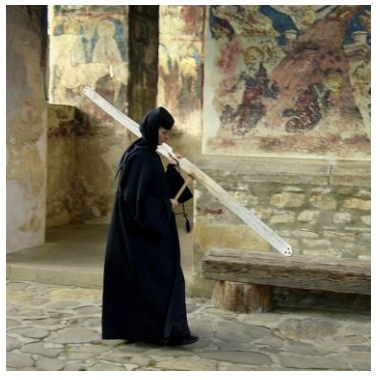The Liturgical Day
Each day, especially in monasteries, is punctuated by periodic prayer. The notion of stopping to pray throughout the day is as old as the Didache (chapter 9)1 in the late first century, which suggests that Christians stop and say the Our Father three times a day. Eventually set services were produced, centering upon fixed units of three psalms. In this system one could pray at the first hour of the day (6.00 a.m.) using the set psalms and prayers; then again at the third hour of the day (9.00 a.m.) using different psalms and prayers; then again at the sixth hour (noon), then again at the ninth hour (3.00 p.m.). Vespers (from the Greek word meaning “evening”) would be prayed at sunset, and then one would pray again before retiring (so-called “Compline”, from the Latin “completorium”, the service which completed the day). Then after a sleep one would arise in the wee hours of the morning to pray for a long time and chant Psalms. That service is called “Matins”—i.e., the morning service.
In this system one stops to pray seven separate times, hearkening back to the Psalm verse which says, “Seven times a day do I praise You” (Psalm 119:64). In its original context, “seven times” was simply short-hand for “often and continually.” These services are known as “the Hours” or “the Divine Office”.

In practice, because of the difficulty of stopping one’s activities so often, the services are often gathered together into two separate groups and prayed in the morning and in the evening. Thus, some monasteries meet in the morning, when they pray the Third and Sixth Hours and then the Divine Liturgy, all without a break. Then they meet again later in the afternoon, when they pray the Ninth Hour, Vespers, Matins, and the First Hour. Compline is prayed privately and separately by the monastics in their cells.
Such a combination of different services into one longer service is done in parishes as well at times of feasts. For example, at Christmas time, all the Hours are combined into one service called “the Royal Hours”.
One does wonder a bit about the practice of combining the separate services into one long service, given that the original purpose of the services was to punctuate the hours of the day with prayer, stopping to pray every few hours, and sanctifying (for example) the Sixth Hour of noon by praying at that time. Time cannot be sanctified in advance, for that is what “time” means. The author of the Didache intended his readers to stop three times throughout the day to say the Our Father and thus offer those various times to God. Stopping only once to say the Our Father three times in a row would not have served the same purpose. It is apparent, then, that practicality sometimes takes precedence over principle. But it is a good thing to remember God as often as one can, stopping to offer prayer. The Our Father, for example, is short enough to be said often throughout the day. It is a very portable form of worship.
Read more: Vespers (opens in a new tab), Matins (opens in a new tab), Hours, Compline and Nocturne (opens in a new tab), Monasticism (opens in a new tab)
Footnotes
-
Also known as The Teaching of the Twelve Apostles, it is one of the earliest Church documents. The first 6 chapters are titled “The Two Ways: The Way of Life, and the Way of Death.” The second and third parts contain instruction for the Eucharist, fasting, prayer, matters of church organization, apostles and teachers, prophets, bishops, and deacons. ↩